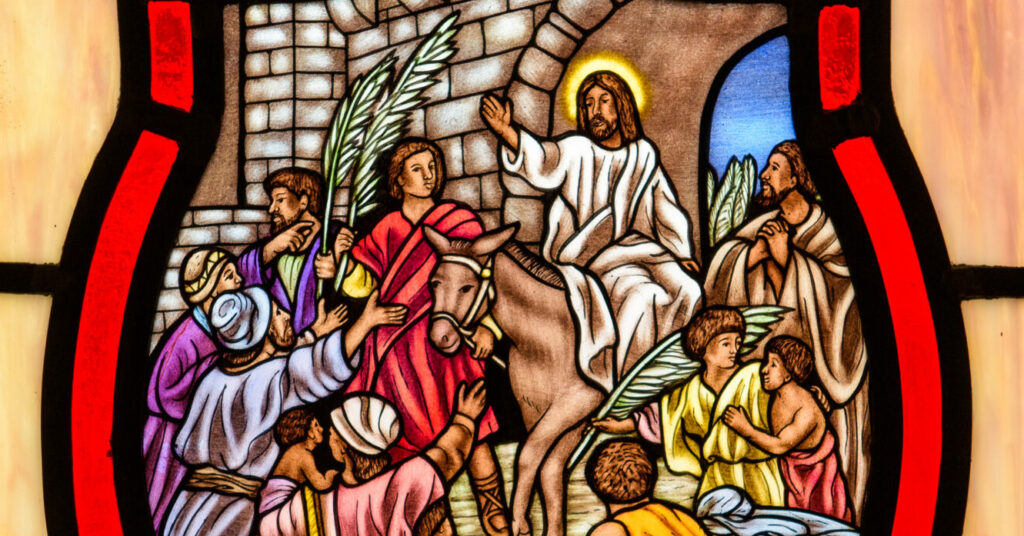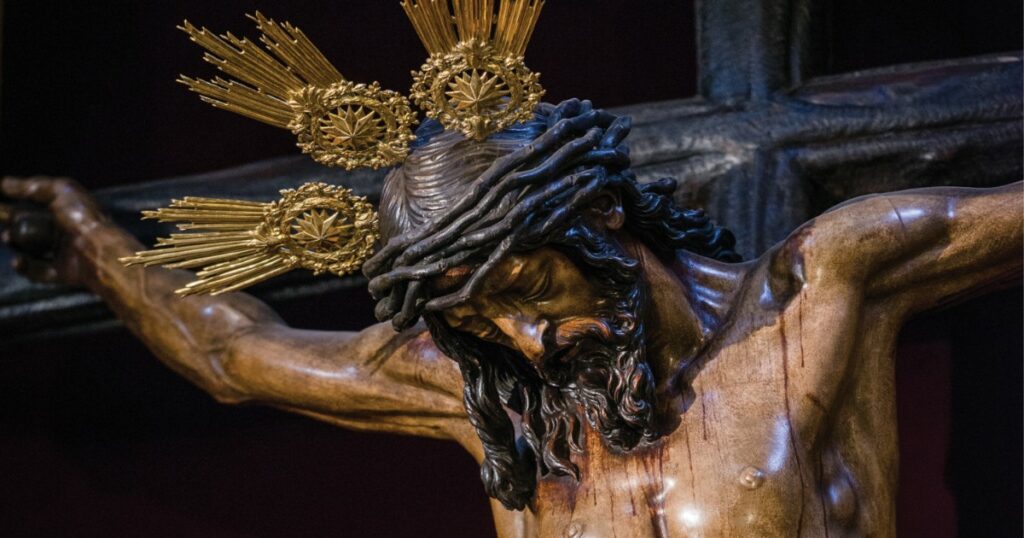By Kevin Golden
Read Zechariah 9 and John 12:12–19.
In their accounts of Palm Sunday, both Matthew (21:5) and John (12:14) report that Jesus’ entry into Jerusalem is a fulfillment of Zechariah 9:9: “Behold, your king is coming to you.” Mark (11:10) and Luke (19:38) also reflect the Lord’s promise through Zechariah in their narratives, reporting the joyful words of the people: “Blessed is the King who comes in the name of the Lord!” It is rather straightforward, after all. Read Zechariah 9:9 and you will find all the boxes are checked as Jesus enters Jerusalem.
“Rejoice greatly, O daughter of Zion! Shout aloud, O daughter of Jerusalem!”
Check. The Jerusalem multitude were rejoicing at Jesus’ entry.
“Behold, your king is coming to you.”
Check. Jesus is the King who comes to Jerusalem.
“Righteous and having salvation is He.”
Check. Jesus is righteous and has salvation.
“Humble and mounted on a donkey, on … the foal of a donkey.”
Check. Jesus is riding humbly upon a donkey.
Jesus checks all the boxes. But our delight in Jesus is diminished if we stop there. He is far more than someone who checks the boxes of the kingly resumé. He pulls all the anticipatory joy of kingship into Himself so that it comes to a fulfillment that eclipses what was expected. In Jesus, the fulfillment is always greater than the promise, always greater than the anticipation.
Kingly joy is woven throughout the whole of the Old Testament. You hear it in the Song by the Sea, when Moses and Israel sang, after walking through the sea on dry ground. Their song reached its concluding climax as they sang, “The Lord will reign forever” (Ex. 15:18). Since the Hebrew word for “king” is derived from a verb that is regularly translated as “rule,” their words testified that the Lord is king forever. What a stark contrast between the Lord who reigns forever and pharaoh who was supposedly god on earth and yet was powerless before the Lord’s prophet Moses. Though a human sits on a throne, the Lord alone is king.
So it goes throughout Scripture: Kingship belongs to the Lord. Following the exodus, the Lord brought His people into the Promised Land. The situation quickly became troublesome, as everyone did what was right in his own eyes because there was no king in the land (Judges 21:25). The chief problem was not that the people lacked a human king, but that they did not live in accord with the King who rules forever, the Lord. In due time, Israel began to long for a king like all the other nations. Samuel warned them of what such a king would do, but Israel would not relent. The Lord told Samuel to give them a king because they had rejected Him as King (1 Sam. 8:7).
Such sinful restlessness infects us just as much as it infected Israel of old. Though Americans profess an aversion toward royalty, this aversion is half-hearted at best. A crown may not adorn his head, yet we all bow the knee before a “king” whom we would have rule over us, one whom we trust to direct our lives. Whom do you honor as “king”?
Even as His people rebelled against His kingship, the Lord was faithfully ruling. During the time of the judges when everyone did what was right in his own eyes, He was at work in the life of Ruth so that she would marry Boaz, that their line would lead to their great-grandson David. Though the Lord told Samuel to give them a king because they had rejected Him as King, yet He gave them King David, “a man after His own heart” (1 Sam. 13:14). David’s heart was most evident in his confession of the Lord as King: David appointed Jerusalem as the capital of Israel and then rejoiced, even danced, as the ark of the covenant was brought into the city (2 Sam. 6:14). The ark was the Lord’s chosen means to dwell among His people on earth. David rejoiced as the ark came into Jerusalem because it meant the King was coming into Jerusalem. The same festal joy of David is seen in the crowd on Palm Sunday. Just as the Lord entered Jerusalem via the ark, so now He comes in the person of Jesus.
Knowing that the Lord is King, David wanted to build a temple (a palace) for Him in Jerusalem. The Lord waited for David’s son Solomon to build His temple. Through this episode, God teaches both David and us what kind of King He is. He said that David would not build a house for Him but that He would build a house for David — a kingdom that would last forever (2 Sam. 7:13). The Lord’s kingship is not about what David, or anyone else, could do for Him but about how He serves David and everyone else. Such kingly service is seen in Christ as He rides into Jerusalem as the fulfillment of the promise to David.
Zechariah longed for this moment. He lived after the Babylonian exile. In 587 B.C., the Babylonians had destroyed Jerusalem, razed the temple and cut off the Davidic line of kings (or so it seemed). Seventy years later, the exile had come to an end. Zechariah was among those back in Jerusalem. It was time for the temple to be rebuilt. It was time for the King to be seen on His throne.
It all comes together as Jesus rides into Jerusalem — not just the Lord’s promise through Zechariah, but everything He had been doing from the Song by the Sea through Ruth and Boaz on to David and Solomon and many others. The crowds sing Hosanna to the Son of David who comes in the name of the Lord, the King for whom they have been waiting. The promise is fulfilled but in far grander fashion than expected. With surprising delight, Jesus makes evident what it means for the Lord to be King. He returns to rule not in power but in humility. Rather than wield the weapons of war, He cuts off chariot, war horse and battle bow (Zech. 9:10). He extends His rule from sea to sea, even to the ends of the earth (Zech. 9:10).
The Lord will rule forever. His reign proclaimed on Palm Sunday takes Him to the cross, through the grave and into eternity so that He rules forever in grace, mercy and forgiveness. “The Lord reigns, let the earth rejoice” (Psalm 97:1).

This article originally appeared in the April 2025 issue of The Lutheran Witness.





